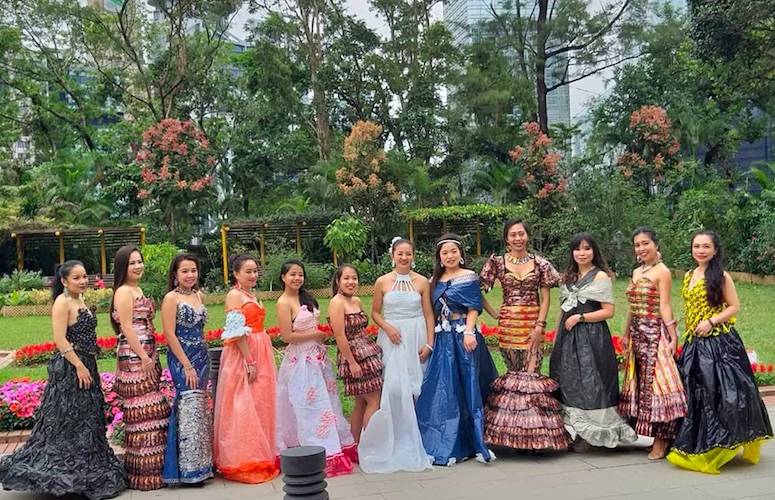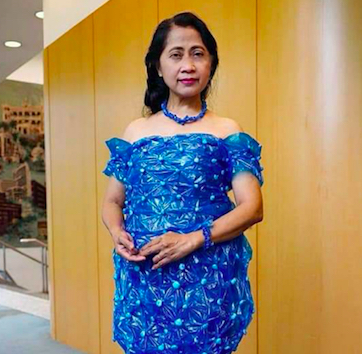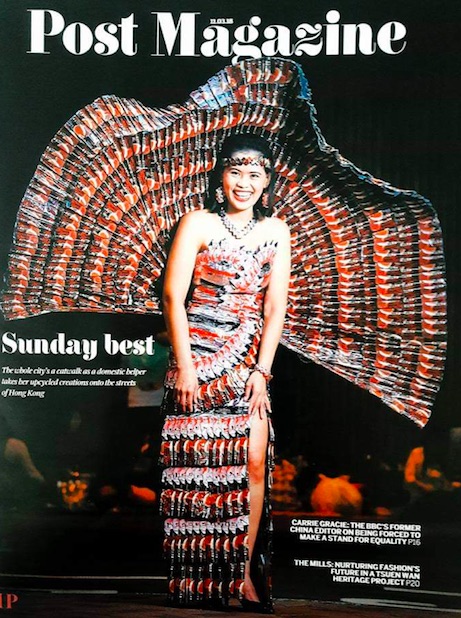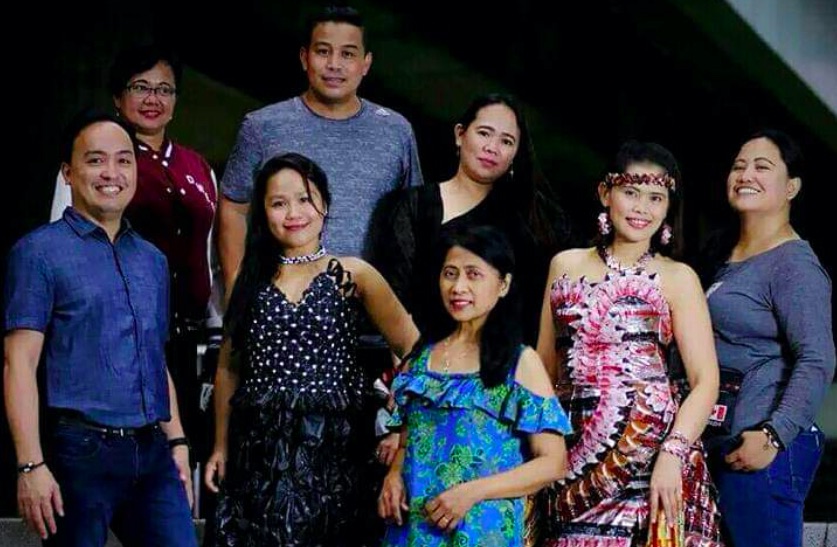Many women from the Philippines leave friends, family, and often their own children to become household staff abroad. The Commission on Filipinos Overseas (CFO) estimated that more than 10 million Filipino or 11% of the population left the country to work and live abroad.
Elpie Leba (Elpidia Malicsi) graduated from college in the Philippines and moved to Saudi Arabia to become a migrant domestic worker for an American family.
Now, more than 30 years later, Ms. Leba has been a migrant domestic worker on three continents. Recently, her artistic talents have been recognized. She has become a fashion designer whose gowns made with upcycled materials such as discarded garbage bags, coffee sachets, and soda can tabs were exhibited at the Philippines Consulate in Hong Kong.
BY PAKSY PLACKIS CHENG
Elpie, you have been with your current employer in Hong Kong as a live-in household staff for the last 19 years. [Foreign domestic workers in Hong Kong are required by law to live with their employers.]
Yes, because they have been very good to me. When the American family decided to go back to the US, I went back to the Philippines. I didn’t want to be so far from my mother. You just have one mother in the world.
Then, for two years, I worked for an Indian family in Hong Kong. I decided to go back to the Philippines to get married and have a baby. I had my daughter at the age of 40.
How old was your baby when you had to go back to Hong Kong to work for your current employer, a Hong Kong Chinese family.
Yes, ma’am, my baby was two years old. Charmane was a jaundice baby and very small—only two kilos. I am lucky, Charmane is 19 years old today.
How often do you get to see your daughter?
Every year. My employer gives me a month holiday every year. I go one or two weeks. Then, when my mother needed me, I would go back.
Your mother and your husband have been taken care of your daughter while you have been living and working in Hong Kong?
Yes. My mother passed away in 2011. Now, my husband is the only one living in my house. My employers gave me a chance to go back to the Philippines two times the year my mother died. My employers are very good with me. I’m so lucky.
Your employer has been very supportive of your personal and professional growth. Is that an exception?
Yes, ma’am. I even have my niece with me since I’m a cancer survivor. My employer hired my niece to be here. They still kept me and now my niece and I work together. My work has gotten lighter.
You’ve been with the employer’s children since they were little. I’m sure your work was a lot more demanding when they were little kids.
When they were little children, my employer, a psychiatrist, gave me a book to teach me about children. I learned and helped raise the children. The children have been very good, they grow up so happy, and they respect other people. I have told myself: I will go back [to the Philippines] for good when the oldest one is finished with university in three years.
You are actually remaining longer in Hong Kong to see your employer’s daughter graduate from university?
Yes, ma’am. I want to. I have a lot of friends waiting for me in the Philippines; they want to start a business with me. I also want to enhance my skills here before I go home.
What else needs to happen before you can go home?
I asked my employer, when the two girls will get married, for an invitation to come back to Hong Kong. The father said, “Of course, Elpie, you are a member of our family. You are not domestic worker to us.” I know I’m just a domestic worker, but they respect everyone. I’m so happy to hear that. That was my request.
What will your life be like back in the Philippines?
I want to have my own business. I have been a domestic worker for a long time. You can’t get in a good situation, because your salary is fixed. I have a lot of things I want to do back home.
What are you like in the Philippines and what are you like in Hong Kong? Are you a different person?
I’m very friendly to everyone. Even here in Hong Kong, I have a lot of friends. I have a lot of skills that I can share with them. Sharing is good. If people from the community are asking me to teach them things, why not? I didn’t go to school to learn my skills. I just watched others, when I go home, I try to do it myself.
You’ve learned a lot of different things: dressmaking from discarded material with a collection exhibited at the Philippines Consulate in Hong Kong; you won a prize for fruit carving; and you also make soaps, and weave textiles. Why is that important to you?
Once you go back to the Philippines, you can’t be sure that you can get a job. I’m 61 years old now. I don’t want to live away with other families anymore. I want to stay with my husband, because we have been apart for a long time.
How do you raise a daughter from so far away?
My husband and I talk everyday. He had a stroke and I told him to stop working. He is the one who’s helping my daughter. I am the one supporting the family. When I go back to the Philippines, we cannot save money. Now, I can make money back home, because I have gained skills. I want a business from my home. I can make any type of food and I can help organize parties. My husband can deliver the food.

Elpie Leba, in collaboration with students from Hong Kong University, turned upcycled discarded plastic bags and tea sachets into gowns. Photo: Elpie Leba.
Tell me about your dressmaking.
I make hand-made gowns. When I am in Central, I bring fabric to make dresses. I make the drawings and designs, and sew by hand. Women have been asking me to make things. When they do, I’d like to first see her in person because I don’t want copy any other designer.
It started out as another skill for when you return home? You have big plans for when you return.
Yes, ma’am, I have big plans. Sometimes, people ask me what I like best, but I like it all.
Do you see many foreign domestic workers go back to the Philippines?
Now, I think yes, because, domestic workers learn a lot of skills in Hong Kong. I learned a lot in the places I stayed. I made cushions and hanging plants in Egypt. In Saudi Arabia, in Riyadh, I learned different types of cooking.
The Philippines must have changed a lot since you left, right? How will it be for you to be back?
Yes, but my town has stayed the same. The salary will be a big thing. You have higher salaries in Hong Kong. You will be able to make more money. If you have skills, you can start your own business in the Philippines.
What will you miss when you leave Hong Kong?
I’ll be missing a lot of things, especially here in the house. My employers are very good with me. I’ll miss my friends here.
What are some of the things that you’ve seen that is important to improve for migrant domestic workers?
When I first worked here, the Country had Chris Patton. [the 28th and final British Governor of Hong Kong.] Then, we had the [Country’s] handover to the Chinese (July 1, 1997).
There have been lots of changes. Domestic workers’ salaries have increased, but the prices of other things have gotten higher also. Most domestic workers don’t have any extra income. It’s very hard if you don’t know how to save your money. You’re always borrowing from the bank because you are free to borrow from the bank. That is a big problem. Then you hear some workers say, “I want to kill myself; I want to jump.” I see a lot of this in the newspaper.
Another problem is that some employers don’t give any rest day. We also work many hours. You can see domestic workers cleaning after midnight and then wake up early in the morning because they have a child to take care of. Also, often I hear that there is not enough food for workers.
If you could change the situation for others, what would you improve?
Improve yourself—there are a lot of things to learn in Hong Kong. The Hong Kong University (HKU) is open to domestic workers. For one semester, you pay around 500 HKD (63,71 USD). I learned first aid, photography, and financial literacy at the Hong Kong University.
A lot of other organizations offer things to learn, the Philippine Consulate opened a financial freedom course on how to save money. This has been a change for domestic workers, because before, we didn’t have anything like that. I’m so sorry for some of the domestic workers, some have no days off, and some workers are singing on the day they are off or making cards. Leisure and activities they need, but then they are left with nothing.
Elpie Leba is also a mentor at the Domestic Workers Empowerment Project (DWEP). DWEP, founded by Dr. Miguel Manio (left on photo), provides free lectures, trainings, and workshops mostly to migrant domestic workers in Hong Kong. Photo courtesy of Elpie Leba.


